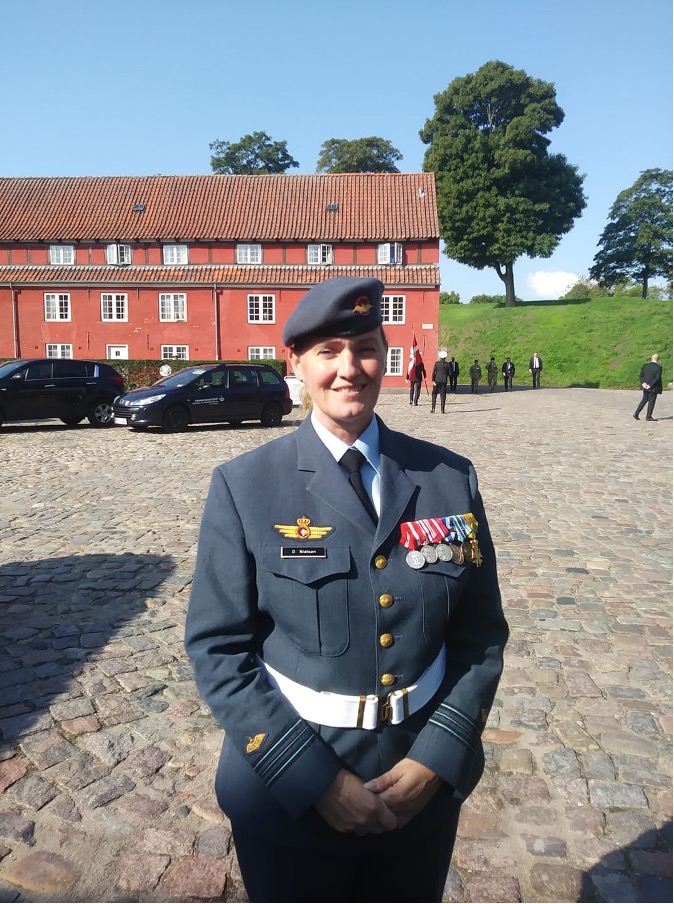Having grown up around horses, Dorte Nielsen saw herself joining the Danish military as a member of its mounted forces. That’s when she hit her first roadblock: the institution (Gardehusarregimentet) did not accept women until 1998.
In 1986, at the age of 18, Dorte joined the Royal Danish Air Force instead.
Fast forward to 2022, Dorte Nielsen has served with the Royal Danish Air Force for 36 years, currently working as a Staff Officer on issues related to military security and host-nation support. Her service has included two six-month deployments as a peacekeeper serving in the United Nations Mission in South Sudan (UNMISS).
In a recent interview with UN Peacekeeping during Women’s History Month, Dorte talked about her career path and the obstacles she faced and overcame, including the lack of female role models in a military career.
Did you have any female military role models growing up?
“Not really. I started in the military when I was 18 and at that time, there were not that many women in the uniformed personnel.”
“So no, I’ve never really had female role models…”
Reflecting on the lack of women’s representation now, as a 54-year-old woman who has served in the Danish Military and also for UNMISS, Dorte recognizes the importance of the visibility of women in uniform, to inspire women and girls both in her home country of Denmark and in the communities she served.

Q: Why is it important to have more women in peacekeeping missions?
“Men and women together in the same workplace creates a good atmosphere and a better tone. It is an advantage to have a mixed gender office, absolutely.”
“I think my work in the mission has given me more focus on the importance of the visibility of female uniformed personnel,” explains Dorte.
Uniformed women serve as role models for women and girls to follow non-traditional career paths. Dorte felt the impact of her presence on local women, even as she went about her day-to-day life in Juba. They saw her contributing to the mission and being independent in a space that is traditionally perceived as being male-dominated .
- What inspired you to become a peacekeeper?
“My first deployment was actually in a NATO mission in Afghanistan, back in 2013. I really enjoyed working in that multicultural environment.”
“I liked to work in the mission and felt that this job was important for the country.”
“After deploying to Afghanistan, I felt that I needed to deploy again.”
When the opportunity arose for Dorte to work with UNMISS in South Sudan in 2016 and again in 2017, she eagerly accepted.

How did working with UN Peacekeeping impact your career path?
“After my first deployment, I followed my dream to become a gender advisor. With my peacekeeping experience, I was given the chance to take a course in Sweden, where I was trained as a gender advisor.”
Following the training, Dorte attended a Female Military Officers course in Kenya in 2017 that she was offered as part of UN Women’s System-wide Strategy on Gender Parity. The course left a lasting impression.
“It was a very good course with very experienced briefers. It was a great experience, being able to talk about gender in missions and discuss the kind of problems that we see in conflict areas around the world and how it’s related to gender.”
Enriched by this experience, Dorte has continued to advise on gender issues in her current role.
At the end of her tour of duty to UNMISS in 2018, Dorte boards a UN airplane in Juba, South Sudan. (Photo: Dorte Nielsen)
Do you have any advice for others considering serving with UN Peacekeeping?

“I would say, go out there, see the world, and do whatever you can do to support the mission for the time you are there. It’s a huge experience and you get to contribute to making the world a better place.”
“I think that it’s amazing to work with people around the world, and to see what we can achieve together. We’re not so different from [others]. And we manage to work together and do the job.”
“I’ve always enjoyed being in the field. Sometimes I’ve even thought about throwing away my passport. People say I’m crazy, but there are times I don’t want to go home.”
Dorte didn’t have female military role models when she joined the Danish military in 1986, so she became one for the next generation of women and girls. She hopes her military career will serve as an inspiration for the next generation of women who are aspiring to pursue military careers.




